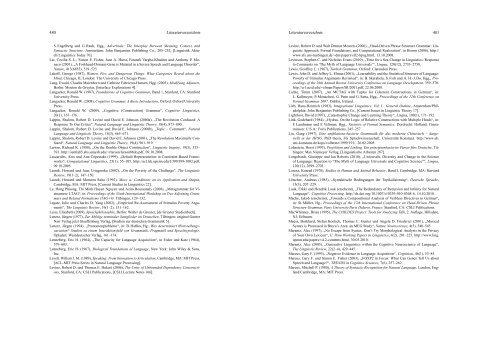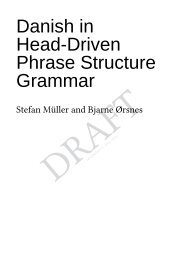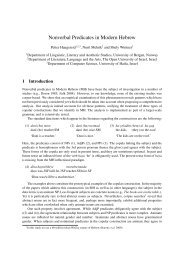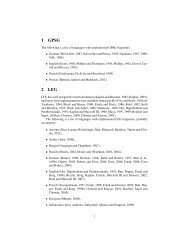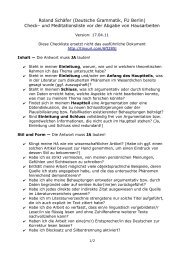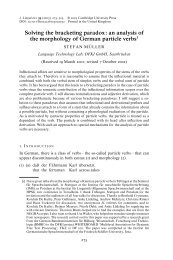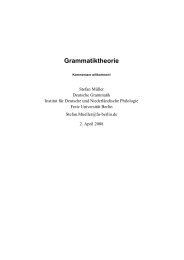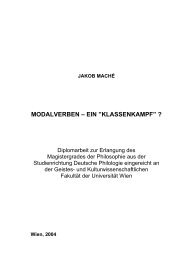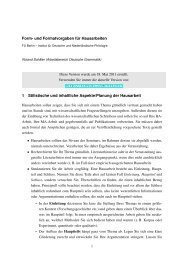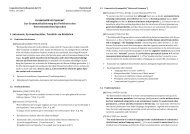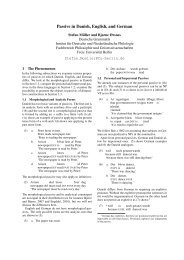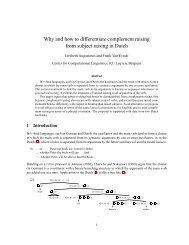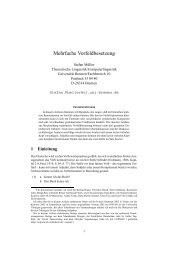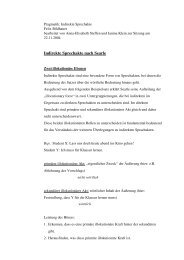Grammatiktheorie - German Grammar Group FU Berlin - Freie ...
Grammatiktheorie - German Grammar Group FU Berlin - Freie ...
Grammatiktheorie - German Grammar Group FU Berlin - Freie ...
Erfolgreiche ePaper selbst erstellen
Machen Sie aus Ihren PDF Publikationen ein blätterbares Flipbook mit unserer einzigartigen Google optimierten e-Paper Software.
480 Literaturverzeichnis<br />
S. Engelberg und G. Rauh, Hgg., Adverbials: The Interplay Between Meaning, Context, and<br />
Syntactic Structure. Amsterdam: John Benjamins Publishing Co., 205–252, [Linguistik Aktuell/Linguistics<br />
Today 70].<br />
Lai, Cecilia S. L., Simon E. Fisher, Jane A. Hurst, Faraneh Vargha-Khadem und Anthony P. Monaco<br />
(2001), „A Forkhead-Domain Gene is Mutated in a Severe Speech and Language Disorder“,<br />
Nature, 413(6855), 519–523.<br />
Lakoff, George (1987), Women, Fire, and Dangerous Things: What Categories Reveal about the<br />
Mind, Chicago, IL/London: The University of Chicago Press.<br />
Lang, Ewald, Claudia Maienborn und Cathrine Fabricius-Hansen, Hgg. (2003), Modifying Adjuncts,<br />
<strong>Berlin</strong>: Mouton de Gruyter, [Interface Explorations 4].<br />
Langacker, Ronald W. (1987), Foundations of Cognitive <strong>Grammar</strong>, Band 1, Stanford, CA: Stanford<br />
University Press.<br />
Langacker, Ronald W. (2008), Cognitive <strong>Grammar</strong>. A Basic Introduction, Oxford: Oxford University<br />
Press.<br />
Langacker, Ronald W. (2009), „Cognitive (Construction) <strong>Grammar</strong>“, Cognitive Linguistics,<br />
20(1), 167–176.<br />
Lappin, Shalom, Robert D. Levine und David E. Johnson (2000a), „The Revolution Confused: A<br />
Response To Our Critics“, Natural Language and Linguistic Theory, 18(4), 873–890.<br />
Lappin, Shalom, Robert D. Levine und David E. Johnson (2000b), „Topic – Comment“, Natural<br />
Language and Linguistic Theory, 18(3), 665–671.<br />
Lappin, Shalom, Robert D. Levine und David E. Johnson (2001), „The Revolution Maximally Confused“,<br />
Natural Language and Linguistic Theory, 19(4), 901–919.<br />
Larson, Richard K. (1988), „On the Double Object Construction“, Linguistic Inquiry, 19(3), 335–<br />
391. http://semlab5.sbs.sunysb.edu/~rlarson/larson88do.pdf, 09.10.2008.<br />
Lascarides, Alex und Ann Copestake (1999), „Default Representation in Constraint-Based Frameworks“,<br />
Computational Linguistics, 25(1), 55–105. http://acl.ldc.upenn.edu/J/J99/J99-1002.pdf,<br />
09.10.2005.<br />
Lasnik, Howard und Juan Uriagereka (2002), „On the Poverty of the Challenge“, The Linguistic<br />
Review, 19(1–2), 147–150.<br />
Lasnik, Howard und Mamoru Saito (1992), Move α: Conditions on its Application and Output,<br />
Cambridge, MA: MIT Press, [Current Studies in Linguistics 22].<br />
Le, Hong Phuong, Thi Minh Huyen Nguyen und Azim Roussanaly (2008), „Metagrammar for Vietnamese<br />
LTAG“, in: Proceedings of the Ninth International Workshop on Tree Adjoining <strong>Grammar</strong>s<br />
and Related Formalisms (TAG+9). Tübingen, 129–132.<br />
Legate, Julie und Charles D. Yang (2002), „Empirical Re-Assessment of Stimulus Poverty Arguments“,<br />
The Linguistic Review, 19(1–2), 151–162.<br />
Leiss, Elisabeth (2009), Sprachphilosophie, <strong>Berlin</strong>: Walter de Gruyter, [de Gruyter Studienbuch].<br />
Lenerz, Jürgen (1977), Zur Abfolge nominaler Satzglieder im Deutschen, Tübingen: original Gunter<br />
Narr Verlag jetzt Stauffenburg Verlag, [Studien zur deutschen Grammatik 5].<br />
Lenerz, Jürgen (1994), „Pronomenprobleme“, in: B. Haftka, Hg., Was determiniert Wortstellungsvariation?<br />
Studien zu einem Interaktionsfeld von Grammatik, Pragmatik und Sprachtypologie.<br />
Opladen: Westdeutscher Verlag, 161–174.<br />
Lenneberg, Eric H. (1964), „The Capacity for Language Acquisition“, in Fodor und Katz (1964),<br />
579–603.<br />
Lenneberg, Eric H. (1967), Biological Foundations of Language, New York: John Wiley & Sons,<br />
Inc.<br />
Levelt, Willem J. M. (1989), Speaking: From Intonation to Articulation, Cambridge, MA: MIT Press,<br />
[ACL-MIT Press Series in Natural Language Processing].<br />
Levine, Robert D. und Thomas E. Hukari (2006), The Unity of Unbounded Dependency Constructions,<br />
Stanford, CA: CSLI Publications, [CSLI Lecture Notes 166].<br />
Literaturverzeichnis 481<br />
Levine, Robert D. und Walt Detmar Meurers (2006), „Head-Driven Phrase Structure <strong>Grammar</strong>: Linguistic<br />
Approach, Formal Foundations, and Computational Realization“, in Brown (2006). http://<br />
www.sfs.uni-tuebingen.de/~dm/papers/ell2-hpsg.html, 13.10.2008.<br />
Levinson, Stephen C. und Nicholas Evans (2010), „Time for a Sea-Change in Linguistics: Response<br />
to Comments on ‘The Myth of Language Universals’“, Lingua, 120(12), 2733–2758.<br />
Lewis, Geoffrey L. (1967), Turkish <strong>Grammar</strong>, Oxford: Clarendon Press.<br />
Lewis, John D. und Jeffrey L. Elman (2001), „Learnability and the Statistical Structure of Language:<br />
Poverty of Stimulus Arguments Revisited“, in: B. Skarabela, S. Fish und A. H.-J. Do, Hgg., Proceedings<br />
of the 26th Annual Boston University Conference on Language Development. 359–370.<br />
http://crl.ucsd.edu/~elman/Papers/BU2001.pdf, 22.06.2008.<br />
Lichte, Timm (2007), „An MCTAG with Tuples for Coherent Constructions in <strong>German</strong>“, in:<br />
L. Kallmeyer, P. Monachesi, G. Penn und G. Satta, Hgg., Proceedings of the 12th Conference on<br />
Formal <strong>Grammar</strong> 2007. Dublin, Ireland.<br />
Lieb, Hans-Heinrich (1983), Integrational Linguistics. Vol. I.: General Outline, Amsterdam/Philadelphia:<br />
John Benjamins Publishing Co., [Current Issues in Linguistic Theory 17].<br />
Lightfoot, David (1997), „Catastrophic Change and Learning Theory“, Lingua, 100(1), 171–192.<br />
Link, Godehard (1984), „Hydras. On the Logic of Relative Constructions with Multiple Heads“, in:<br />
F. Landmann und F. Veltman, Hgg., Varieties of Formal Semantics. Dordrecht: Holland, Cinnaminson:<br />
U.S.A.: Foris Publications, 245–257.<br />
Liu, Gang (1997), Eine unifikations-basierte Grammatik für das moderne Chinesisch – dargestellt<br />
in der HPSG. PhD thesis, FG Sprachwissenschaft, Universität Konstanz. http://www.ub.<br />
uni-konstanz.de/kops/volltexte/1999/191/, 26.02.2005.<br />
Lohnstein, Horst (1993), Projektion und Linking. Ein prinzipienbasierter Parser fürs Deutsche, Tübingen:<br />
Max Niemeyer Verlag, [Linguistische Arbeiten 287].<br />
Longobardi, Giuseppe und Ian Roberts (2010), „Universals, Diversity and Change in the Science<br />
of Language: Reaction to “The Myth of Language Universals and Cognitive Science”“, Lingua,<br />
120(12), 2699–2703.<br />
Lorenz, Konrad (1970), Studies in Human and Animal Behavior, Band I, Cambridge, MA: Harvard<br />
University Press.<br />
Lötscher, Andreas (1985), „Syntaktische Bedingungen der Topikalisierung“, Deutsche Sprache,<br />
13(3), 207–229.<br />
Luuk, Erkki und Hendrik Luuk (erscheint), „The Redundancy of Recursion and Infinity for Natural<br />
Language“. Cognitive Processing. http://dx.doi.org/10.1007/s10339-010-0368-6, 14.10.2010.<br />
Maché, Jakob (erscheint), „Towards a Compositional Analysis of Verbless Directives in <strong>German</strong>“,<br />
in: St. Müller, Hg., Proceedings of the 17th International Conference on Head-Driven Phrase<br />
Structure <strong>Grammar</strong>, Paris University Paris Diderot, France. Stanford, CA: CSLI Publications.<br />
MacWhinney, Brian (1995), The CHILDES Project: Tools for Analyzing Talk, 2. Auflage, Hillsdale,<br />
NJ: Erlbaum.<br />
Maess, Burkhard, Stefan Koelsch, Thomas C. Gunter und Angela D. Friederici (2001), „Musical<br />
Syntax is Processed in Broca’s Area: an MEG Study“, Nature Neuroscience, 4(5), 540–545.<br />
Marantz, Alec (1997), „No Escape from Syntax. Don’t Try Morphological Analysis in the Privacy<br />
of Your Own Lexicon“, U. Penn Working Papers in Linguistics, 4(2), 201–225. http://www.ling.<br />
upenn.edu/papers/v4.2-contents.html, 30.05.2010.<br />
Marantz, Alec (2005), „Generative Linguistics within the Cognitive Neuroscience of Language“,<br />
The Linguistic Review, 22(2–4), 429–445.<br />
Marcus, Gary F. (1993), „Negative Evidence in Language Acquisition“, Cognition, 46(1), 53–85.<br />
Marcus, Gary F. und Simon E. Fisher (2003), „FOXP2 in Focus: What Can Genes Tell Us about<br />
Speech and Language?“, TRENDS in Cognitive Sciences, 7(6), 257–262.<br />
Marcus, Mitchell P. (1980), A Theory of Syntactic Recognition for Natural Language, London, England/Cambridge,<br />
MA: MIT Press.


